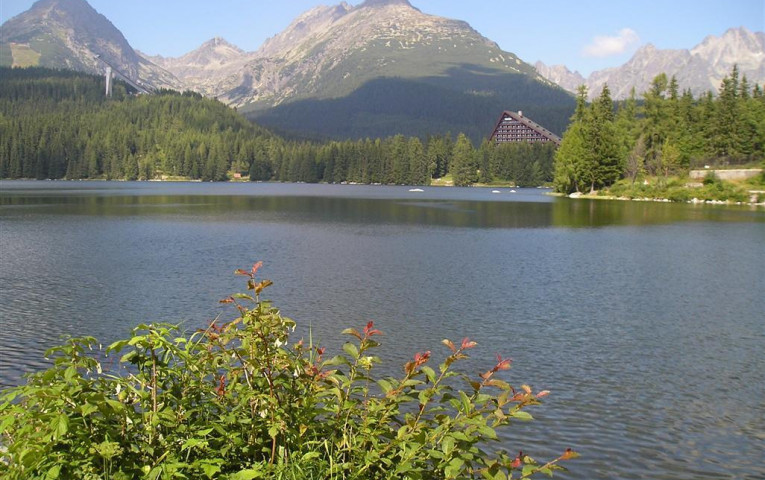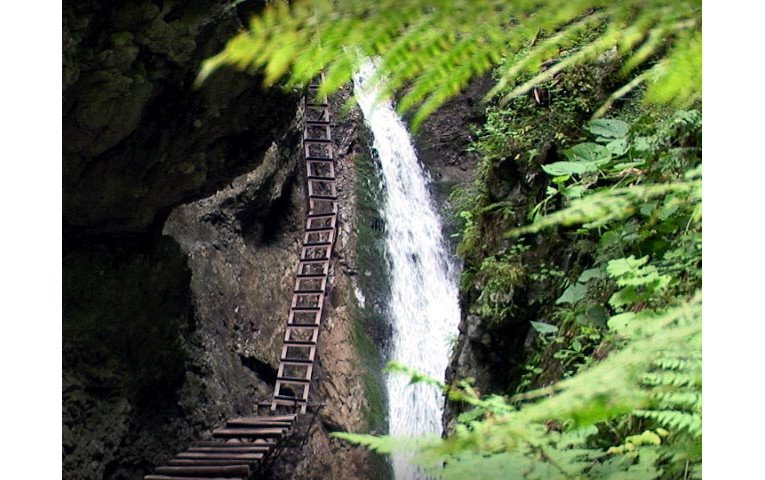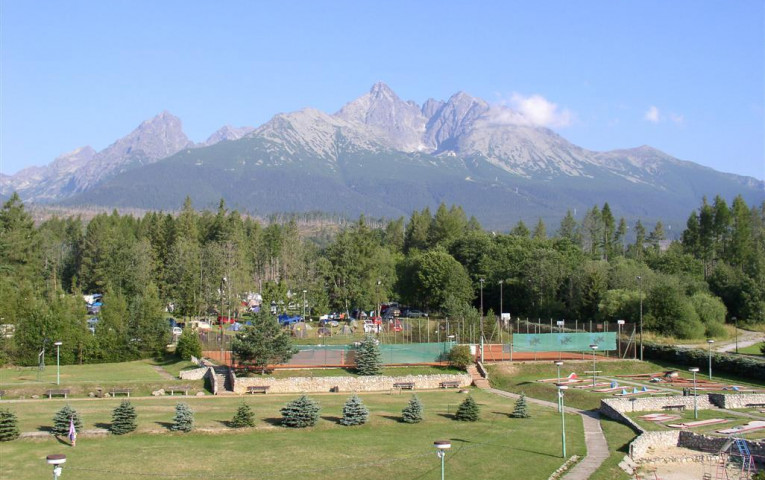Slovakia
Slovakia is located in the middle of the Europe, neighbouring 5 states: Hungary, Austria, Poland, Czech Republic and Ukraine. It is the center of the Europe (geographically): Church of Saint John in Kremnicke Bane.
Official name: Slovak Republic
Date of the republic's establishment: 1.1.1993
State organization: republic
Political system: parliamentary democracy
Territorial division: 8 regions
- Bratislavský
- Trnavský
- Nitriansky
- Trenčiansky
- Žilinský
- Banskobystrický
- Prešovský
- Košický
Official language: Slovak
Capital city: Bratislava (population 431 061)
Area: 49 035 km2
Population: 5 429 763 ( to 30 June 2010)
Ethnicity of the population: Slovak (85.8%), Hungarian (9.7%), Romany (1.7%), Czech (0.8%), Russian, Ukrainian, Russian, German, Polish and others (2%)
President of the republic: Doc. JUDr. Ivan Gašparovič, CSc., Dr.h.c.
Currency: euro
Membership of international organizations: EU, NATO, OSN, UNESCO, OECD, OBSE, CERN, WHO, INTERPOL etc.
Time zone: Central European time (+ 1 hour from GMT) Summer time/daylight- saving time from March to November is + 2 hours from GMT
International Code: SVK / SK
Dialling Code: +421
CLIMATE
The climate of Slovakia is among the range of continental and oceanic. Slovakia climate can be divided into 3 zones:
Lowlands
- The average annual temperature is about 10 °C.
- Maximum 20 °C and Minimum –3 °C.
Basins
- The average annual temperature is about 5 to 8,5 °C.
- Maximum 15 – 18,5 °C and Minimum –3 to –6 °C.
Mountains
- The average annual temperature is about 5 °C.
- Maximum under 15 °C and Minimum –5 °C.
Waters
- Rivers mostly rooted here and are little watery. Waters of Slovakia are divided into the Baltic and Black Sea.
- Blind lakes in Slovakia are formed by the decline of the mountain iceberg. For example Strbske Pleso, Hincovo velke Pleso, Popradske Pleso or Skalnate Pleso.
- Most dams are on the river of Vah. For example Liptovska Mara, Slnava, Kralova, Nosice and other…
- Groundwater is divided into 3 types: 1. Carst water – found in caves; 2. Mineral water; 3. Thermal water – the warmest thermal water in the Slovak Republic is in Piestany (69 °C);
- Geographical extremes
- The highest point: Gerlachovsky peak (2 654,4 m)
- The lowest point: the clough Brazda (-180,5 m), south of Roznava
TRANSPORT
Highways
The total length of roads is 42 993 km. Categories of roads: roads of I. class, roads of II. class, roads of III. class, speed communications, highways (D1, D2, D3, D4).
The cars are driven on the right. The road network is very good. The highways are paid by toll sticker, which you can buy at border crossings, the larger post offices and petrol stations. They are valid for one calendar year. For the passenger cars with a cylinder up to 1600 cm and including the toll is 13,278 € /400 Sk/, the cars over 1600 cm the toll is 26,566 € /800 Sk/. For the trucks and buses you pay more.
Maximum speed is 50 km/h in the village, 80 km/h outside a village, 130 km/h on motorways and roads of 1st class. Using of safety belts is compulsory. Consuming of alcohol is forbidden. In each car must be a first-aid kit, tow rope, warning triangle and spare tyre. City traffic: Buses provide public transport in Slovak cities, which are supplemented by trams and trolleybuses. You can also use taxis, which are parked on every corner. Tourist rate for 1 kilometre journey in the city is from 0,335 € /10 Sk/ to 0,664 € /20 Sk/ according to the city.
Air transport
In Slovakia there are 36 airports. Slovakia has in overall 6 international airports, namely in Bratislava, Kosice, Piestany, Poprad, Sliac, Zilina.
Bus traffic
Bus lines are very dense therefore the bus can get you into the all major and smaller cities. You can use the high-quality long distance and local bus lines.
Rail transport
Rail network is very developed in Slovakia, measures around 3 600 km. Slovak railways still improve so they provide both very comfortable and pleasant services. Trains link all the major cities and also small villages.
Water transport
Gains increasing importance. The main trunk road is of course the Danube, where is possible to make a sightseeing tours and trips. It is also possible to travel to Budapest or Vienna.
ECONOMICS
Euro has been in use in Slovakia since 1 january 2009. It is one of the fastest developing countries in Europe.
Agriculture
Slovakia has developed agriculture. Mostly is cultivated corn around Bratislava and in the region of Tokaj is the wine. In the higher localities is developed breeding of domestic animals, mainly sheep and livestock. In the southern areas is cultivated mainly pepper, on the north potatoes.
Industry
In Slovak economy leads in particular automobile industry, there are factories of Volkswagen, Peugeot-Citroën, Kia. Among important sectors belongs electrical industry, companies such as Sony, Samsung. Slovak industry has a favourable expectation for economic development and should grow in coming years.
The real estate market
Real estate prices in the last 5 years extremely increased. Bratislava as the capital city was the main object of investors, the result was the price increasing around 20%. This market is currently slowing down a bit and other locations such as High Tatras, Kosice, Banska Bystrica and Presov also reflect the increase in prices.
Prices in the High Tatras have doubled and with more investments coming to the region each year, this trend of increasing will continue in the medium term. From wind catastrophe that hit the Tatry and destroyed a large number of trees throughout the region, the EU assumpsit to provide approximately 6 million to help the recovery of the nature. Developer J & T presented the 5* Kempinsky hotel in the High Tatras and is currently working on the extension of the ski slopes and improvements of winter infrastructure. Except of this are planned development projects in the style of holiday resorts, which naturally help to increase tourism in the region.
GASTRONOMY
Slovak cuisine is very assorted, differs on the regions. It is effected by the surrounding kitchens, mainly Czech, Polish and Hungarian. In the Slovak gastronomy dominate food of country origin. For the northern area of Slovakia are typical farmyard dishes such as bryndzove halusky (meal consisting of small dumplings in a cheese sauce), despite of the south of Slovakia where the dishes are mostly from Hungarian kitchen such as Goulash. The national dish is bryndzove halusky.
RECREATIONAL LOCALITIES
Slovak mountains and recreation centres at their foot or in the center are the most visited. Several resorts are located directly in national parks where the special rules of behaviour are set. They are ideal opportunity for tourism lovers and lovers of the variety of adrenaline sports. In the winter the most lively places are the ski resorts, which offer skiing and other winter activities. Even though Slovakia has no sea, even within Europe is the farthest country from the sea and with only little number of natural lakes there are good conditions for water sports and swimming. There are many artificial water reservoirs, made from gating of rivers or after the mining of gravel and sand. For recreational purposes are used most Slovak dams except of some reservoirs of drinking water. Important centres for recreation and relaxation are also spa towns.
Vaccination and health measures
Before the arrival to Slovakia there is no need for special health measures. It is recommended the vaccination against ixodes, especially if you plan to be more frequently in forests.
Insurance
In addition to the normal travel insurance is also necessary, when in the mountains, to insure in the case of mountain accident. In some localities this insurance is part of the tourist fee.
Health services
In all major cities are hospitals. In smaller cities and tourist localities are available ambulance and pharmacy. Before the arrival to the Slovakia is recommended to underwrite the health insurance, which is part of a package of travel insurance. If necessary medical assistance call 112 or specialized rescue service.
Visa and necessary documents
For the citizens of the European Union is enough just valid identity card. For the list of countries whose citizens need a valid entry visa to Slovakia, visit the website of Ministry of Foreign Affairs or you can inform directly at the relevant embassy.
LOCAL CUSTOMS
On entry into the Slovak dwelling the domestics take shoes off and offer their guests home slippers. In many households is considered to be inappropriate to move in residential areas in the shoes which are used outdoors. To offer a tot of Slovak alcohol – Slivovica or similar distillate is considered as act of generosity and respect and if there is no serious reason it is inappropriate to refuse such an offer. This is true particularly in rural areas where domestics offer distillate of own production. When greeting, the kith and kin shake their hands, if closest of friends or family members it is customary to kiss on one or both cheeks and hug. When introduce unknown people is decent to shake the hand, in the informal atmosphere also lightly kiss.
Buying process
After confirming your interest in the property offered by us it is essential to reserve the selected property. This reservation is realised by paying reservation deposit either in cash or bank transfer. Amount of deposit varies, depends on the conditions set by the seller or developer.
When booking off-plan property you will get the Preliminary contract. After paying the reservation deposit the instalments and final payment after completion of the project will be followed. Payments are usually made by bank transfer directly to the developer's bank account. Payment terms vary from project. In case of buying the completed property the reservation deposit is paid, after the Contract is signed the rest of purchase price is due. Then you will be issued with Title deed. Purchase can be financed by a mortgage loan that we will arrange through our mortgage specialist. We offer the possibility of using a mortgage loan by several banks in Slovakia, with whom we work. EU citizens have more choices. Banks usually charge a fee for processing a mortgage amounting to 0.5% – 1%.
Documents to be submitted:
- ID Card
- A/ Income verification documents in case of labour relations
- Verification-declaration for the amount of income on the form supplied by the bank,
- Bank statements for the last three months,
- Preliminary purchase-sale agreement / non residential premises (draft agreement is enough)
- B/ Income verification documents in case of non-labour relations
- Income-Tax statement for the last taxation period,
- Tax declaration for last taxation period issued by competent tax office,
- Bank statements for last three months,
- Preliminary purchase-sale agreement / non residential premises (draft agreement is enough)
Property can be also purchased through the company. If the buyers set up a company in Slovakia, only because of the purchase of property and are not VAT payers in the past, can not claim a VAT refund. If the buyer has an established company which is a VAT payer he may request a refund. It is recommended to the buyers to use the services of professional financial advice in these matters. For foreign clients it is not necessary to open a bank account in Slovakia, if they have a mortgage. It is not necessary for buyers to travel to Slovakia for signing the Preliminary contract. The contract requires only a classic signature of both parties. For signing the purchase agreement and acceptance of apartment after completion, the buyers may travel to Slovakia, or may authorize with their full powers a representative (commonly the legal adviser).
TAXES AND FEES
- Real estate transfer tax is not applicable in Slovakia.
- Inheritance tax is not applicable in Slovakia.
- Annual property tax depends on the type of property (flat, family house, apartment, villa) and its amount depends on the location where the property is situated and what are the specific tax rates approved by particular city, parish council.
- Slovakia has a flat tax system 19% of value added tax, capital gains and income.
- For foreigners is also 19%.
Buying property by a Foreigner
Since joining the European Union, virtually anyone can buy property in Slovakia. The real estate market is open and does not discriminate neither citizenship, nor place of residence. Also, it does not matter whether the potential
buyer wants an apartment in the city, house in the countryside or cottage in the mountain area.
The only exception is agricultural and forest land. According to the Law on protection and use of mineral wealth (Mining Act or so-called Water Act 184/ 2002 Coll), foreigners can not buy or receive such property as a gift. However,
from the 1st May 2007 foreigners can buy (or get as a present ) agricultural and forest land, provided that the potential buyer conducted business on the land for a minimum of three years and has temporary residence in Slovakia.
Also, according to the legislation, legal persons (companies) having registered seat in Slovakia, are also considered as Slovak residents and as such, can purchase agricultural or forest land without any restrictions. So, for foreigners there is another option of establishing a company in Slovakia just for the special purpose of buying such a property. Either way, if a foreigner wants, he/she can buy /directly or indirectly/any property in Slovakia.
The property market willbe fully liberalized in May 2011,w hen the transition period negotiated with EU ends. But even nowadays, Slovakia offers one of Europe´s best opportunities for investment with low prices and solid growth.
Why to invest in Slovakia
1. Macroeconomic stability
- excellent investment environment
- trouble free access to business enterprise
- expansion of satisfied established investors
- growing interest of potential investors
2. Strategic position
- Slovakia – a bridge connecting West and East Europe
- business market with more than 350 mil. people
- international transport oil and gas pipelines running through the country
3. Interconnection with world economics
- member of Organisation for Economic Co-operation and Development (OECD)
- member of World Trade Organisation (WTO)
- up to 91% of export rate is headed to OECD countries
- number of EU from 2004
- number of Schengen Space from 1.1.2008
4. Low tax burden
- implementation of 19% flat rate tax from 1.1.2004
- compared with member states Slovakia has the lowest tax burden
5. Available competent manpower
6. Low labour costs
7. Industrial tradition
(automobile, electric, machinery and wood-processing industry) and strategic sectors (information and telecommunication technologies, software development, pharmaceutical industry, production of microelectronics and ICT)




